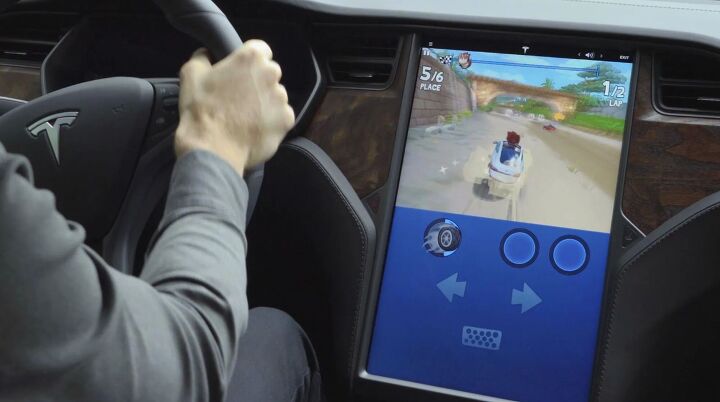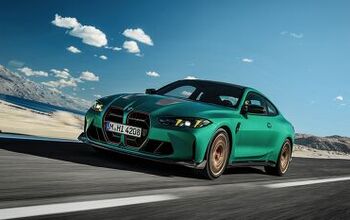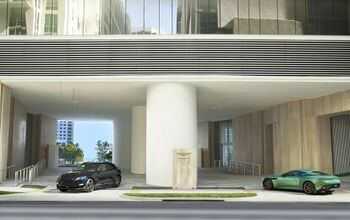NHTSA Ends Probe Into Tesla's Video Game Feature

On Tuesday, the National Highway Traffic Safety Administration (NHTSA) announced that it was wrapping up its investigation into Tesla’s "Passenger Play" feature. The service originally offered occupants the ability to play a slew of video games while vehicles were in motion. But this was changed after the automaker felt pressure from federal regulators.
The NHTSA launched its investigation in December of 2021, concerned that the feature may prove distracting. While the agency cited it as a “Preliminary Evaluation,” Tesla was clearly stressed about what that might lead to and modified the gaming service to function only while vehicles were stopped.
According to Reuters, the NHTSA has confirmed that it will not be seeking a recall of the 580,000 automobiles it was investigating. Though it predictably remains worried, after some of the relevant data provided by the manufacturer “produced significant concerns about driver distraction during the time that it was available.”
From Reuters:
NHTSA said in closing the investigation without seeking a recall it was not indicating "a finding by NHTSA that no safety-related defect exists. Furthermore, it does not foreclose the agency from taking further action, if warranted."
Tesla, which did not immediately respond to a request to comment, told NHTSA that no consumer complaints or collisions had been reported concerning the use of Passenger Play in the subject vehicles during a year of use.
NHTSA said that a month after Tesla voluntarily disabled Passenger Play capability with an over-the-air software update it reported a 97 [percent] completion rate. NHTSA's investigation covered Tesla vehicles sold since 2017 that had the feature.
NHTSA said "apparent driver use of Passenger Play while not in Park in approximately a third of the trips in which the feature was in use demonstrates the importance of affirmative technology-based lockouts over administrative controls such as labeling or disclaimer screens."
Despite there not being a lot of firm rules on how infotainment systems are integrated into the driving experience, federal regulators have often attempted to offer guidance without setting anything in stone. The NHTSA proposed automakers ensure infotainment systems and interior layouts “factor safety and driver distraction-prevention into their designs” in 2014. Ideally, the agency said that vehicles should be made so that drivers cannot “perform inherently distracting secondary tasks” whenever they’re supposed to be driving.
But the very existence of modern infotainment screens has proven to be more distracting than what came before. Your author even has suspicions that they may be one of the reasons we’ve seen accident rates spike in recent years. Meanwhile, some advanced safety systems appear to create more opportunities for drivers to take an increasingly passive role behind the wheel with regulators starting to recommend them as standard equipment.
It’s quite the conundrum and something the NHTSA should undoubtedly be aware of, as it has likewise been running an investigation into the efficacy of Tesla’s Autopilot feature for ages. The Department of Transportation (DOT) had initially narrowed its focus on the automaker over the aggressive way Autopilot was marketed. But it eventually began looking at other companies offering similar systems, which is probably what it should have done, to begin with.
Still, the DOT signaling fears that some advanced driving aids aren't all they're cracked up to be rarely translates into direct actions being taken to prohibit or improve them. With few exceptions, automakers can implement things as they please, provided that they don't interfere with preexisting safety regulations. Though exceptions have been made for test vehicles and even pilot programs vying to deliver fully autonomous vehicles.
While it’s difficult to say what the correct approach is, the NHTSA seems to be missing the forest for the trees. Over the last decade, touchscreen-based interfaces have gone from a novelty to ubiquitous and there’s a wealth of data to support assertions that they’re making everyone more distracted. Focusing on whether or not motorists can play video games while flying down the expressway doesn’t address the larger issue.
Every automaker under the sun wants to force their customers into utilizing those screens as often as possible so they can leverage new services and features into something profitable. Data capture is also an issue the industry has pivoted toward of late and, despite connected cars gathering a lot of data for manufacturers just by being on the road, companies would prefer to have consumers interfacing with on-board screens (rather than phones) whenever possible.
Though I suppose it’s good news that Tesla drivers hoping to adjust their air conditioning only need to be preoccupied with a massive central touch screen while hurtling down the road at 70 mph.
[Image: Tesla]
Become a TTAC insider. Get the latest news, features, TTAC takes, and everything else that gets to the truth about cars first by subscribing to our newsletter.

A staunch consumer advocate tracking industry trends and regulation. Before joining TTAC, Matt spent a decade working for marketing and research firms based in NYC. Clients included several of the world’s largest automakers, global tire brands, and aftermarket part suppliers. Dissatisfied with the corporate world and resentful of having to wear suits everyday, he pivoted to writing about cars. Since then, that man has become an ardent supporter of the right-to-repair movement, been interviewed on the auto industry by national radio broadcasts, driven more rental cars than anyone ever should, participated in amateur rallying events, and received the requisite minimum training as sanctioned by the SCCA. Handy with a wrench, Matt grew up surrounded by Detroit auto workers and managed to get a pizza delivery job before he was legally eligible. He later found himself driving box trucks through Manhattan, guaranteeing future sympathy for actual truckers. He continues to conduct research pertaining to the automotive sector as an independent contractor and has since moved back to his native Michigan, closer to where the cars are born. A contrarian, Matt claims to prefer understeer — stating that front and all-wheel drive vehicles cater best to his driving style.
More by Matt Posky
Latest Car Reviews
Read moreLatest Product Reviews
Read moreRecent Comments
- MaintenanceCosts Yes, and our response is making it worse.In the rest of the world, all legacy brands are soon going to be what Volvo is today: a friendly Western name on products built more cheaply in China or in companies that are competing with China from the bottom on the cost side (Vietnam, India, etc.) This is already more or less the case in the Chinese market, will soon be the case in other Asian markets, and is eventually coming to the EU market.We are going to try to resist in the US market with politicians' crack - that is, tariffs. Economists don't really disagree on tariffs anymore. Their effect is to depress overall economic activity while sharply raising consumer prices in the tariff-imposing jurisdiction.The effect will be that we will mostly drive U.S.-built cars, but they will be inferior to those built in the rest of the world and will cost 3x-4x as much. Are you ready for your BMW X5 to be three versions old and cost $200k? Because on the current path that is what's coming. It may be overpriced crap that can't be sold in any other world market, but, hey, it was built in South Carolina.The right way to resist would be to try to form our own alliances with the low-cost producers, in which we open our markets to them while requiring adherence to basic labor and environmental standards. But Uncle Joe isn't quite ready to sign that kind of trade agreement, while the orange guy just wants to tell those countries to GFY and hitch up with China if they want a friend.
- CEastwood Thy won't get recruits who want to become police officers . They'll get nuts who want to become The Green Hornet .
- 1995 SC I stand by my assessment that Toyota put a bunch of "seasoned citizens" that cared not one iota about cars, asked them what they wanted and built it. This was the result. This thing makes a Honda Crosstour or whatever it was look like a Jag E type by comparison.
- 1995 SC I feel like the people that were all in on EVs no longer are because they don't like Elon and that trump's (pun intended) any environmental concerns they had (or wanted to appear to have)
- NJRide My mom had the 2005 Ford 500. The sitting higher appealed to her coming out of SUVs and vans (this was sort of during a flattening of the move to non-traditional cars) It was packaged well, more room than 90s Taurus/GM H-Bodies for sure. I do remember the CVT was a little buzzy. I wonder if these would have done better if gas hadn't spiked these and the Chrysler 300 seemed to want to revive US full-size sedans. Wonder what percent of these are still on the road.


































Comments
Join the conversation
How about a new game?
It's called, "DRIVE THE FOOKING CAR YOURSELF".
Does it have "Hide the Sausage"? That is the game Tassos and EBFlex will be playing in there